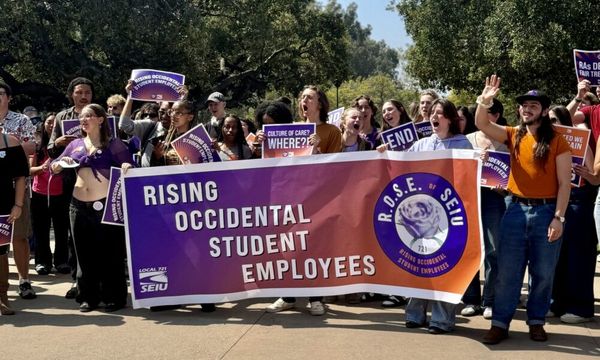
Hong Kong (AFP) - China's push to ensure multinationals toe the line seeped into the legal sphere this week as Beijing sanctioned a top British law firm -- a surprise move that resurrected concerns about the future of Hong Kong's courts.
With Western criticism mounting over its human rights record, Beijing has gone into attack mode in recent days.
It placed tit-for-tat sanctions on individuals and entities from the European Union and Britain who have taken up the cause of China's Uyghur Muslim minority in Xinjiang.
And it fired up a social media war against several Western brands inside China who have declined to use cotton grown in Xinjiang over widespread reports of rights abuses.
For apparel brands such as H&M, Nike and Adidas, the sudden Chinese consumer boycott reinforced Beijing's expectation that multinationals refrain from any criticism of its policies.
But this week's sanctions opened up a new front in China's push for corporate loyalty -- international law firms.
Among the British entities included on China's latest blacklist on Friday was Essex Court Chambers, a top commercial litigation firm.
That announcement sent shockwaves through the legal community in Hong Kong, because those sanctioned are banned from doing business in, or travelling to, the finance hub.
"It lit up our phones, even lawyer friends who are not particularly political," a Hong Kong barrister told AFP, requesting anonymity.
Hong Kong's future
The reason the latest sanctions rattled nerves is the unique legal status the city holds -- a position some fear is at risk.
Unlike China's party-controlled courts, Hong Kong boasts an internationally respected common law system that forms the bedrock of its business hub reputation.
Top lawyers from common law jurisdictions, including Britain, operate in the city or are instructed by companies and individuals there.
Now, a major law firm with a presence in Asia has been frozen out.
Essex Court Chambers did not respond to requests for comment.The firm boasts some 90 barristers and has a Singapore office.
Searches on Hong Kong court system shows some of its top litigators -- known as QCs -- have taken on cases in Hong Kong in the last few years.
The London office for Lawrence Collins, a former UK Supreme Court judge who currently sits on Hong Kong's top Court of Final Appeal, is also registered to the same address as Essex Court Chambers.
Beijing's sanctions statement did not detail what specifically the firm had done to warrant inclusion.
But last month four members of the chamber published a legal opinion that China's actions in Xinjiang constituted "crimes against humanity" after being instructed by rights groups.
'Clumsy threat'
The punishment of an entire chamber sparked alarm, especially in Britain.
Barristers are self-employed and join chambers to share office and administration costs.They have no control over what cases their colleagues take.
David Anderson, a senior British barrister at a rival firm, described Essex Court Chambers staff as "some of the most distinguished international lawyers in the world".
"Its members are all self-employed independent barristers, who will not be intimidated into silence by clumsy threats of this kind," he told AFP.
"By severing contact with some of the world's top experts in international law, the Chinese regime condemns itself."
Julian Ku, an international law expert at New York's Hofstra University, said Beijing may not have realised how precedent-setting the inclusion of an entire international law firm could be.
"I get the feeling the UK sanctions were drawn up in haste and without much careful consideration in China, which might explain why Essex Court Chambers as a whole was sanctioned," he told AFP.
Hong Kong and Beijing have dismissed concerns about the city's legal hub status.
But doubts are becoming more vocal, especially after Beijing imposed a sweeping national security law that grants the mainland jurisdiction in some cases.
Chinese leaders have made clear they expect all those involved in running Hong Kong -- including judges -- to be "staunch patriots".
And the Hong Kong Bar Association has been repeatedly slammed by Chinese state media for voicing concerns over the rule of law.
Britain is currently reviewing whether to continue sending judges to sit on Hong Kong's top court.
Schona Jolly, chair of the UK's Bar Human Rights Committee, called Beijing's targeting of Essex Court Chambers "maladroit and self-defeating".
"Such a misstep only sharpens the attention of the world on the plight of those in Xinjiang, and heightens the perception that the commitment of the Chinese state to the rule of law, including in Hong Kong, is unstable and hollow," she told AFP.







